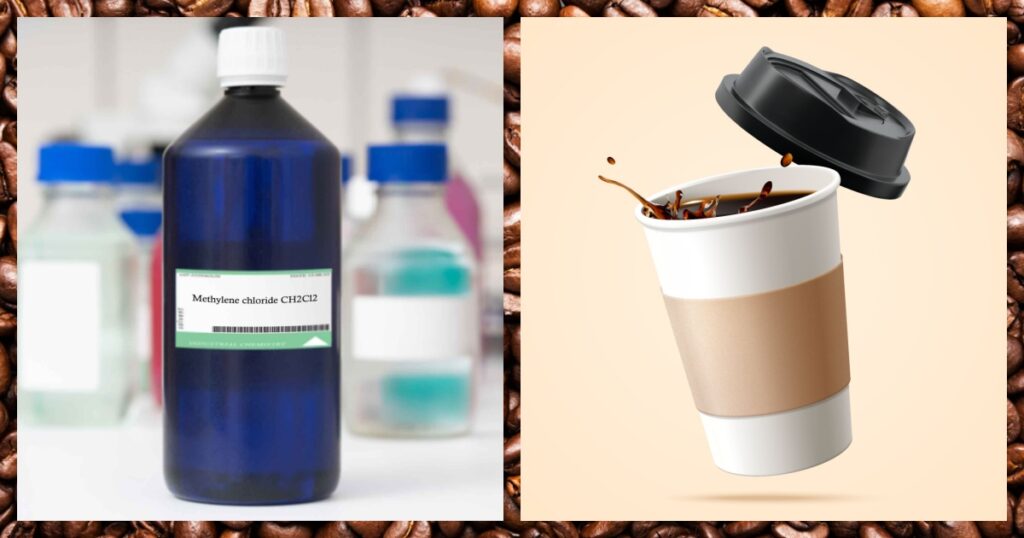Decaf coffee has stood for a long time as a popular choice for people who enjoy the taste without the stimulating effects of caffeine. However, recent concerns raised by health groups have created uncertainty regarding the safety of certain decaffeination methods. The main focus of these concerns is a chemical called methylene chloride, which is used in some decaffeination processes and has been linked to cancer. Let’s take a closer look at the risks associated with decaf coffee and discuss some alternatives for those concerned about the process.
Methylene Chloride And Decaf Coffee

Methylene chloride is a colorless liquid used in industrial processes like paint stripping and metal cleaning (already off to a great start). This additive sits at the center of the controversy regarding decaf coffee. It is classified as a carcinogen by reputable organizations such as the National Toxicology Program and the World Health Organization, and as such, has sparked petitions urging the FDA to ban its use in food processing, including decaffeinating coffee.1 A bill has even been proposed to study and further regulate the consumption of methylene chloride and update its maximum allowable level by January 2026.
Read More: How You Can Use Coffee Grounds To Repel Insects, Fertilize Lawns And Do Other Household Chores
Understanding the Risks

The toxicity of methylene chloride obviously raises health concerns, with issues like liver toxicity, neurological effects, and potentially fatal outcomes at high exposures. The EPA has already taken steps to restrict its use, banning it as a paint stripper and proposing additional limitations on consumer and industrial applications. Despite the progress, it exists in the decaffeination process and, therefore, also in decaf coffee, which has prompted calls for stricter regulation in food processing.
Decaf Coffee and Consumer Safety

For consumers, it’s really a matter of safety, and it looms large. While the FDA permits the use of methylene chloride in decaf coffee within specified limits, citing that “the residues of methylene chloride must not exceed ten parts per million (0.001%) in decaffeinated roasted coffee and in decaffeinated soluble coffee extract (instant coffee).” However, the potential risks are still up for debate. Advocacy groups, such as the Clean Label Project, argue that safer alternatives exist, pointing to methods like the Swiss Water Process, which uses zero chemical solvents for caffeine extraction.
Read More: The New Trend of “Coffee Napping” Will Blow Your Mind (and make it more alert)
Exploring Safer Alternatives

Companies like Starbucks have started using alternative decaffeination methods to stay ahead of the curve. One such process is using liquid carbon dioxide (AKA the Swiss Water Process) to safely extract caffeine and reassure consumers of a commitment to safety in their decaf coffee options. These methods prove there are viable alternatives for those seeking decaf coffee without using methylene chloride.
Navigating Consumer Choices

With these concerns coming forward, people may wonder what kind of decaf coffee is safest to drink. Opting for brands that use solvent-free methods like the Swiss Water Process or those labeled as “certified organic” are safe choices to bring peace of mind to those concerned.2 Also, doing your best to stay informed about the decaffeination process other brands use can empower you to make healthier choices.
Conclusion

While decaf coffee seemingly offers a best-of-both-worlds scenario for some, additives like methylene chloride raise valid safety concerns. Advocating for stricter regulations and supporting brands that use safer decaffeination methods can make a world of difference in everyone’s health and well-being. Decaf coffee remains a popular choice for many, so it’s essential to remain vigilant and be sure to use decaf options that align with personal preferences and safety standards.
Read More: Coffee Clash: Which Medications Should You Avoid With Your Morning Joe?
Sources
- “Is decaf coffee safe to drink? Experts weigh in on claims by health advocacy groups.” CNN. Kristen Rogers. April 17, 2024
- “Is decaf coffee bad for your health? Here’s what to know.” The Globe and Mail. Leslie Beck. April 22, 2024.

